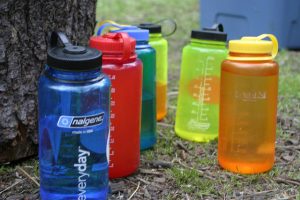
Attribution: Flickr Commons
Before the 1990’s, when researchers began publishing papers on the harmful health effects of Bisphenol A (BPA), hard plastic polycarbonate consumer products were mostly made with the chemical monomer. Scientists uncovered that BPA, in similar structure to the estrogen, estradiol, interacts with estrogen receptors in the body, disrupting the endocrine system. This estrogenic activity can cause infertility, heart disease, cancer, neurobehavioral deficits, and more. After public demand, numerous countries began banning BPA, mainly in food and drink containers and baby products.


Estradiol (Top) and Bisphenol A (Bottom). Attribution: Wikimedia Commons and Wikimedia Commons.
Flash forward to now and our water bottles say “BPA-free”; however, this gives us a false sense of safety for, while our water bottles are free of Bisphenol A, the alternative resins used by plastic manufacturers are similar in structure and, as research shows, in negative health effects. Chemicals such as Bisphenol S (BPS) and Bisphenol F (BPF) are used as BPA alternatives in the production of PC plastic bottles and their chemical structures appear just, if not more, like estradiol than BPA.


Bisphenol F (Top) and Bisphenol S (Bottom). Attribution: Wikimedia Commons and Wikimedia Commons.
A study published in Environment Canada found BPA-free consumer water bottles that leach BPA-like chemicals, causing the same effects to the endocrine system. The Austin, Texas private lab, CertiChem, measured the estrogenic activity of various plastic consumer bottles including black and blue CamelBak, blue and green Nalgene, Topaz, and Zeonor reusable plastic bottles. By exposing breast cancer cells, that multiply when their estrogen receptors activate in the presence of estrogen-like chemicals, to the plastic water bottles, and stressing the bottles using UV light, they determined whether these bottles were leaching estrogenic activity such as that of BPS and BPF. Their study confirmed that CamelBak and Nalgene bottles excreted Estrogenic chemicals, while Topaz and Zeonor reusable bottles remained intact even during stressed conditions.
So, if this news is as alarmingly shocking to you as it was for me and you are on the lookout for another water bottle, CertiChem‘s paper suggests that purchasing Topaz or Zeonor products is a better choice than Nalgene and CamelBak; of course, if you remain unsure, non-plastic stainless steel bottles may be the best choice for you. I just bought one at Manna.
For more information, watch the following video.

-Lori Waugh

2 responses to “BPA-free Doesn’t Mean Estrogenic-free”